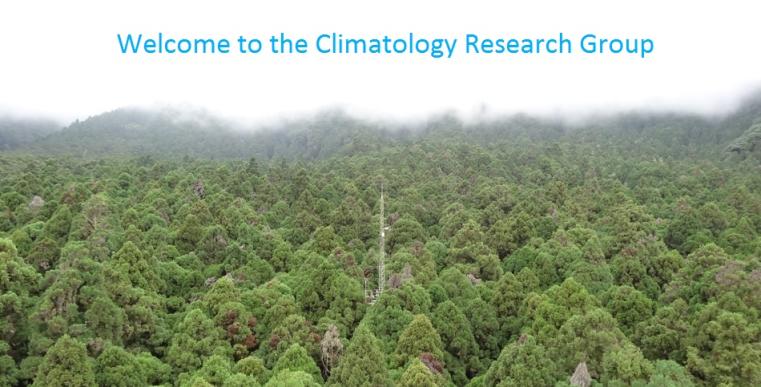
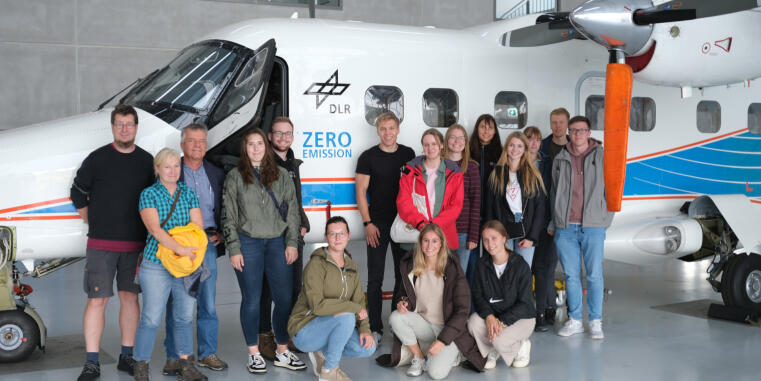
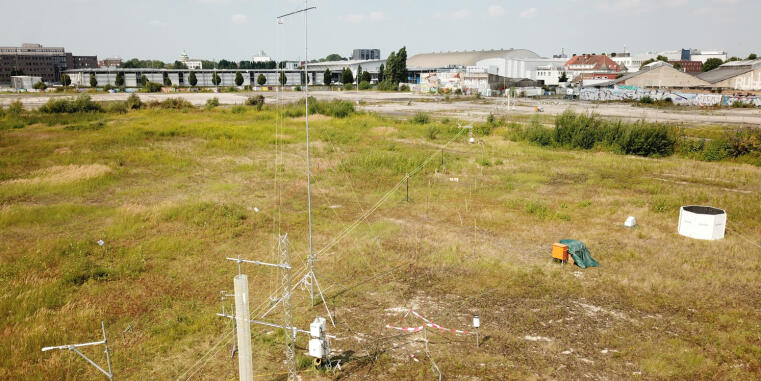
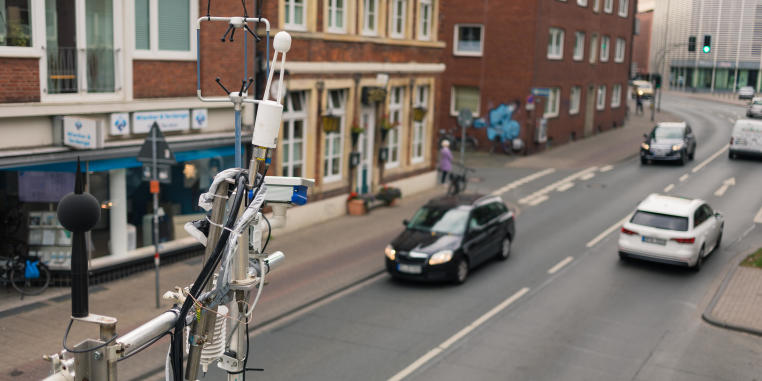

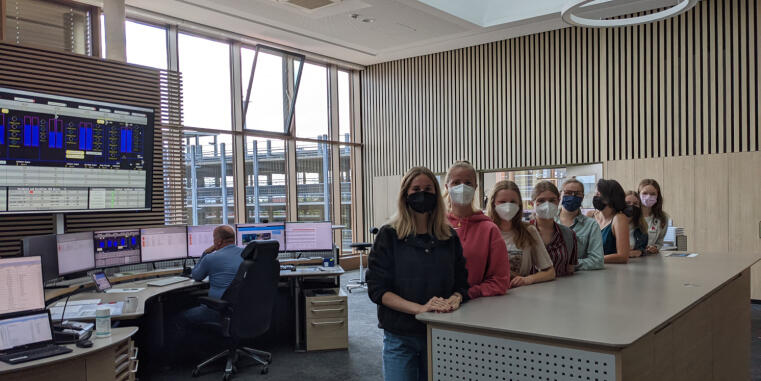
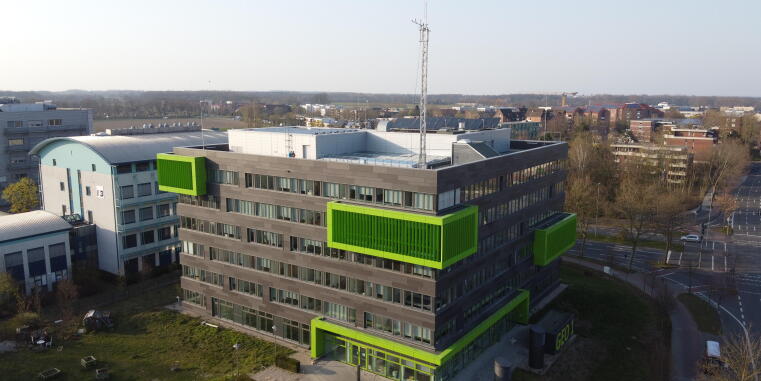
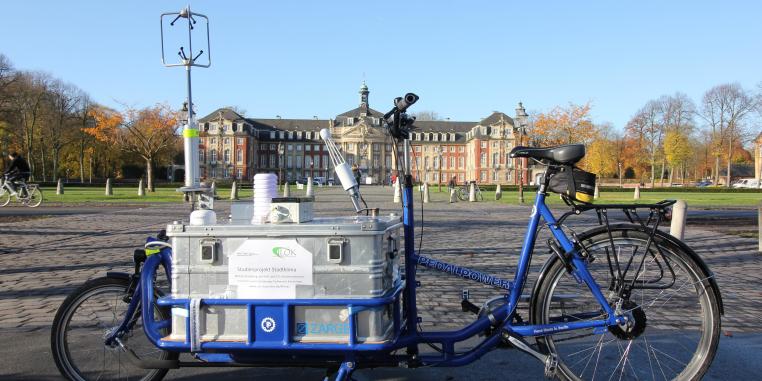
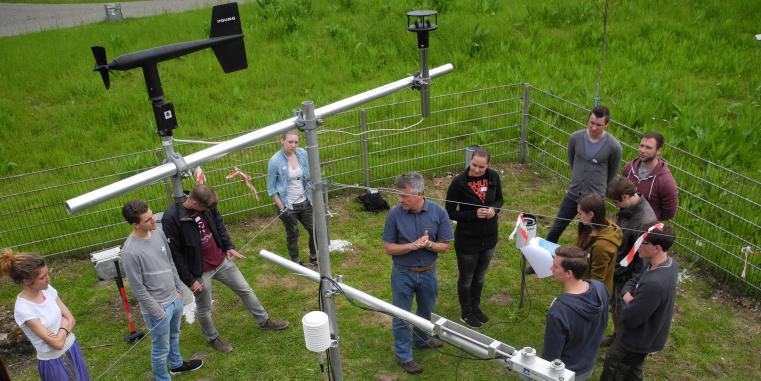
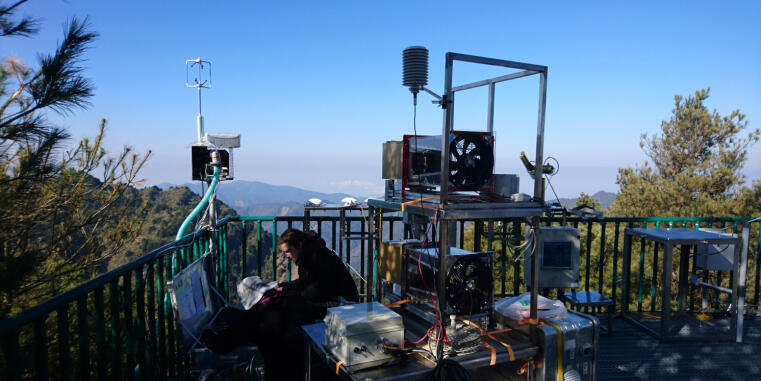
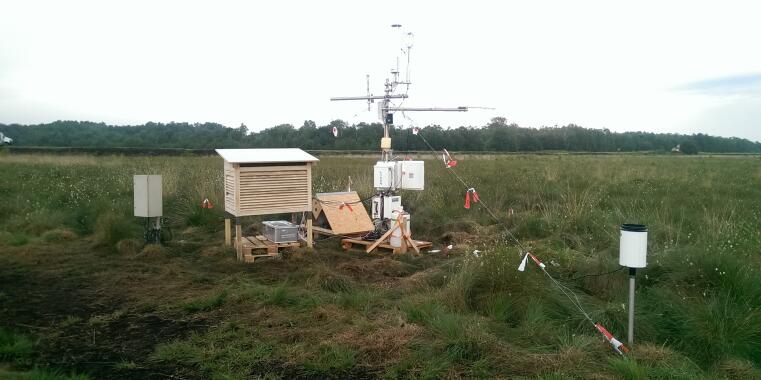
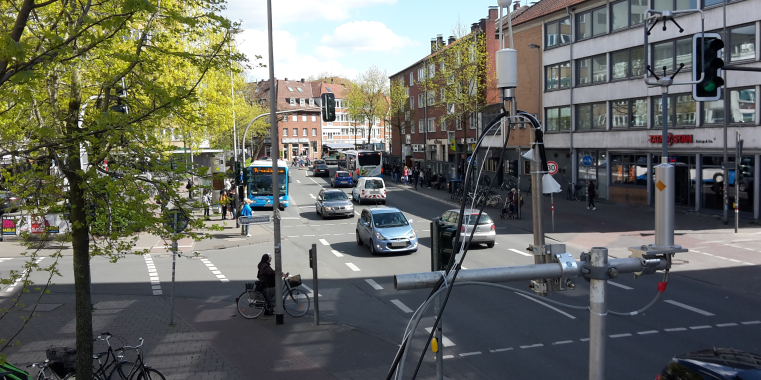
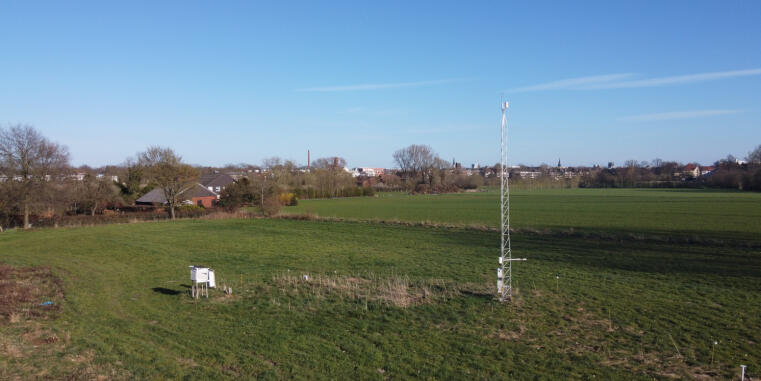













Prof. O. Klemm is now at the National Central University (NCU), Taiwan. Please use this email address: oklemm@atm.ncu.edu.tw. This homepage is no longer updated after October 2024 and will remain as an archive.
Dr. Fatemeh Mayvaneh joins the Climatology Research Group. Her research is about urban climate, air pollution, and their combined impact on human health: "Modelling the combined effects of environmental factors and urban landscape patterns on the rehabilitation of the health system on the urban micro-scales" A warm welcome!
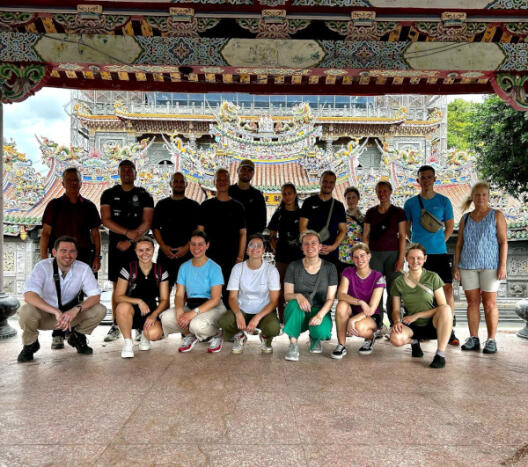
Since September 4, a group of students of Landscape Ecology and Geography together with Prof. Klemm is on the road in Taiwan! For twelve days they are exploring the island of Taiwan from Taipei in the north via the research stations in Xitou and on Mount Lulin all the way to Kenting in the south. Along the Pacific coast in the east, the group will travel north again with stops, e.g. in Guang Fu and at the Taroko Gorge. Our students report daily updates at instagram.com/taiwanexkursion!
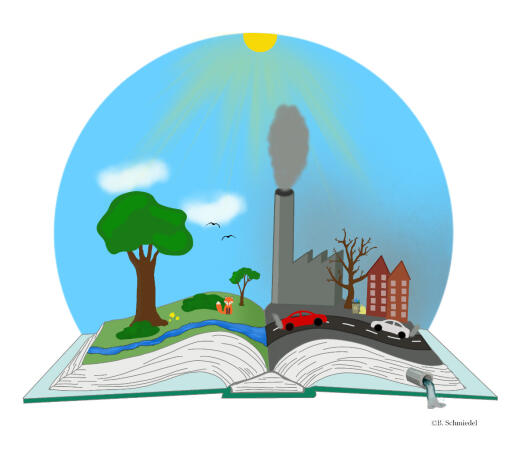
Strengthening knowledge and options for action on the topic of climate in biology lessons.
This block seminar is about competence regarding urban climate and climate change especially in biology classes. How can these topics be optimally taught to students in a scientific context? Thematically, climatological factual knowledge is combined with experiments and games for teaching and direct options for action.
The event is primarily (but not exclusively) aimed at students (Bachelor's and Master's) with the career goal of becoming a teacher. How can the complex processes of climate change be didactically communicated? Why exactly is it so much warmer in the city than in the countryside= What are the effects? What exactly is the difference between weather and climate?
| Date | Saturday, 17.06.2023 |
| Time | 9 – 16 h |
| Registration | at Belana Schmiedel, b_schm49@uni-muenster.de short informal mail, with information about study program and semester until 02.06.2023 at the latest. |
| Loaction | Heisenbergstr. 2, Lernatelier Geo 1, Münster |
| Certificate of achievement | Certificate of attendance for 1 ECTS point. |
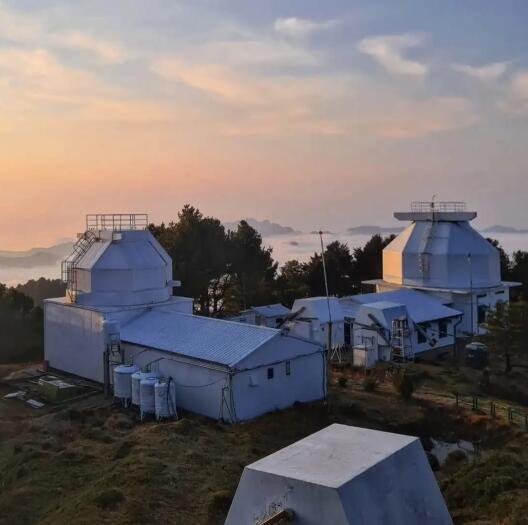
Since March 14, a part of the Climatology Research Group is again on the approx. 2800 m high Mount Lulin in Taiwan. Here we want to continue our previous measurements from the last years and collect meteorological data as well as fog, whose chemical composition will be analyzed later in the laboratory. We hope for exciting new findings! Our students Madeleine Falkowski and Robin Achtstetter report on their experiences in Taiwan in our blog!
At present, consultation hours are only held digitally and by prior appointment by email: otto.klemm@uni-muenster.de
From October 2023, the office hours will be held again on Tuesdays at 10 - 12 hrs in room 535, Geo I.
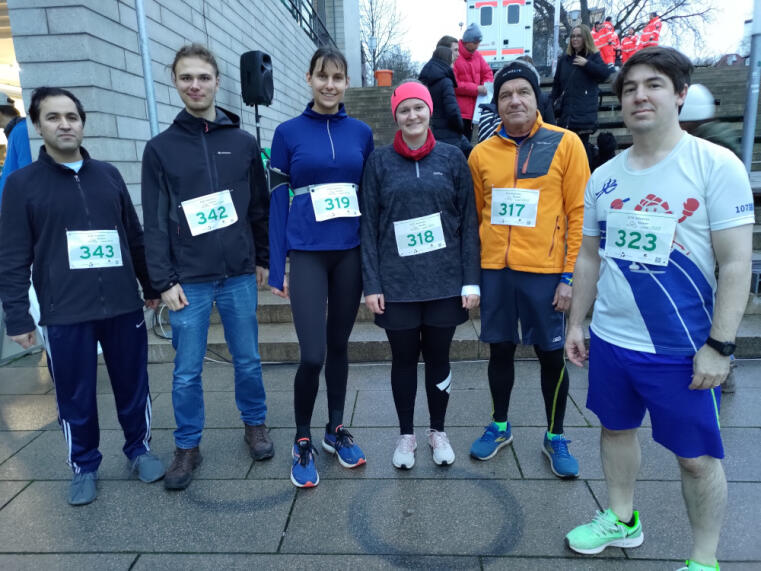
On Sunday, 27 November, some climatologists participated in the Advent Aaseelauf 2022. We ran as a group and had a lot of fun.
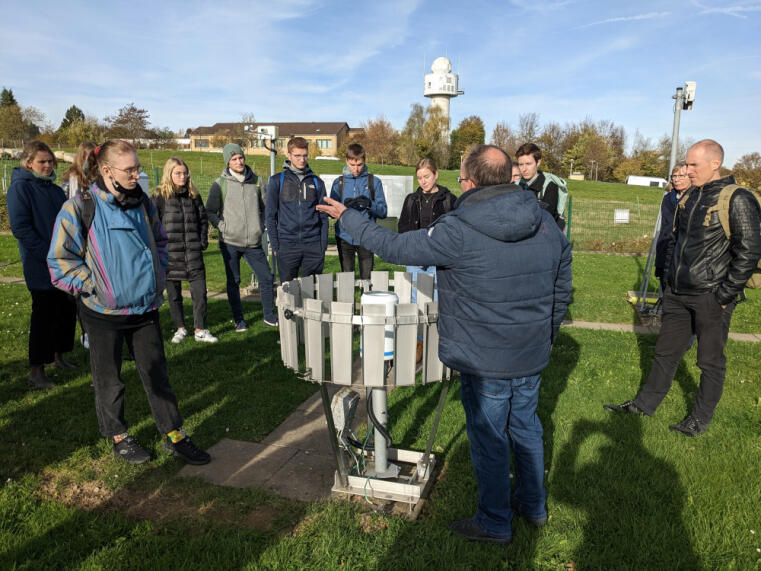
On November 11, 2022, after a long break, our 1-day excursion to the DWD and LANUV in Essen could take place again. Many thanks to the colleagues there, who created an interesting day for us.
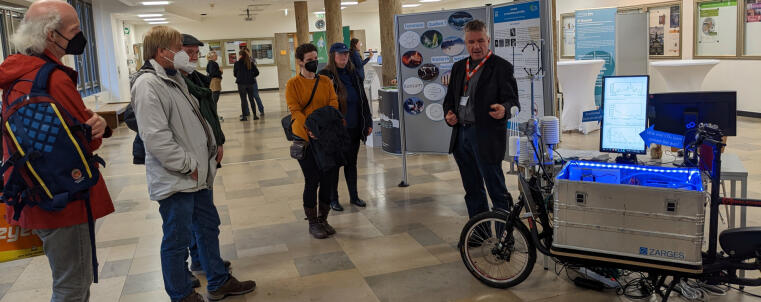
At the first Sustainability Day of the WWU, we presented our mobile measurement platform, the Particulate Matter Cargo Bike. Throughout the day, we demonstrated real-time measurements of CO2, fine and ultra-fine particulate matter, air temperature, wind speed and direction. Thus, everyone was able to examine, among other things, their CO2 emissions and a wide variety of fine dust emitters, e.g. their own jacket, newspaper or wool socks. In addition to the practical experience on the "measuring bike", there were exciting insights into past and current research projects related to the particulate matter cargo bike. At 3 p.m., Prof. Klemm gave a presentation on the particulate matter problem, the differences and health effects of fine and ultra-fine particulate matter, and the measurement technology of the mobile measurement platform.
Our latest publication deals with the emission of the greenhouse gas methane from the city of Münster. Mobile and stationary measurement platforms were employed for the study. We found that more methane is emitted than previously thought. Leaks in the underground gas supply system do play a role.
A really interesting story about fog in California, as published in the New York Times. Check here.
Inhalt: Meteorologisches Messfeld des DWD, Radiosondenaufstieg, Regionales Wetterbüro, Aufgaben des LANUV, Luftqualität, Sondereinsatzfahrzeuge, Labor; Anreise: gemeinsam mit Bahn / Bus Voraussetzung: Vorlesung Klimatologie oder Vorlesung Physische Geographie I und Seminar Klimageographie oder Masterstudium Landschaftsökologie; Kosten: Keine extra-Kosten bei Vorliegen des Semestertickets. Selbstverpflegung aus der Tasche; Anmeldung per E-Mail bis 23. Oktober 2022 an otto.klemm@uni-muenster.de Betreff: Exkursion LANUV und DWD; first-come-first serve; Zusagen am 24. Oktober 2022
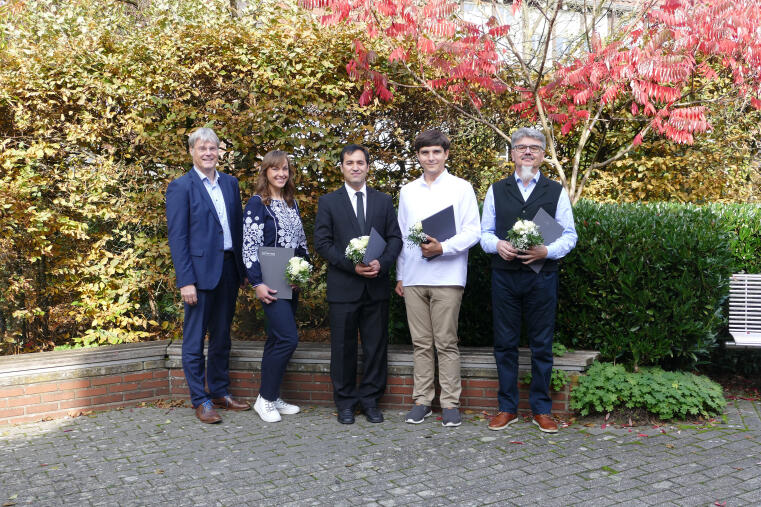
... Dr. Emal Wali at the institute for Landscape Ecology. Emal Wali came to Münster recently from Afghanistan. He is supported through a fellowship of the Philipp Schwartz-Initiative for initially 2 years. Emal Wali received his PhD in Japan, he is interested in water management/agriculture/remote sensing in the broadest sense. Warm welcome!
A seat has become available in the excursion trip to Garmisch-Partenkirchen, Umweltforschungsstation Schneefernerhaus, Zugspitzgipfel, Meteorologisches Obsevatorium Hohenpeißenberg (DWD), Deutsches Zentrum für Luft- und Raumfahrt (DLR). 5 - 9 September 2022. Are you interested? Please contact O. Klemm asap.
... are published here: LINK (German language only)
We join the race for the highest temperatures. During the July 2022 hot spell, we recorded the highest temperature 37.0 °C on Sunday, July 19. How should we classify this value? (i) Is this climate change? Answer as always, yes and no. No, because one or more hot spells represent weather patterns, but not long-term climate. Yes, because climate change makes the occurrence of hot spells more likely. We have been measuring temperature at our roof sites since 2003. The highest value (37.6 °C) was recorded on May 25, 2019, with August 2, 2013 and July 19, 2017 (both 36.7 °C) sharing third place (after July 2022). (ii) We measured the maximum temperature of 37.4 °C at our Sterinfurter Str. site (Münster) on 19 July, 2022. The German Weather Service DWD recorded a maximum of 37.7 °C at the Münster-Osnabrück Airport (FMO) station. In the Ruhr region, the DWD recorded higher values in Duisburg, with a maximum of 39.1 °C. Regional differences occur e.g. due to urbanization. (iii) All data are 10-min-mean averages. Corresponding hourly values are somewhat lower. We know from turbulence research that temperature differences in short time intervals can be very large, e.g. 2 degrees every second. Short averaging periods (e.g. 1 minute) can therefore lead to significant differences. Conclusion: A high measured temperature tells us: Yes, it was hot. The classification of individual values requires great care.
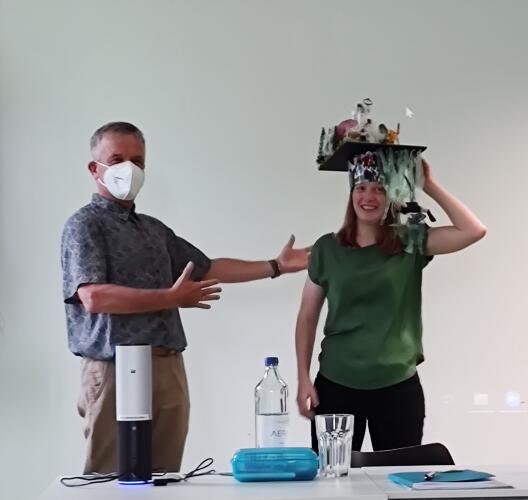
Congratulations for successful completion of your promotion, Bettina Breuer!
There is no regular open office hour in the Geo 1 building during semester break. Please make arrangements per email. You may come to the office again starting 11 October 2022, Tuesdays 10 - 12 hrs.
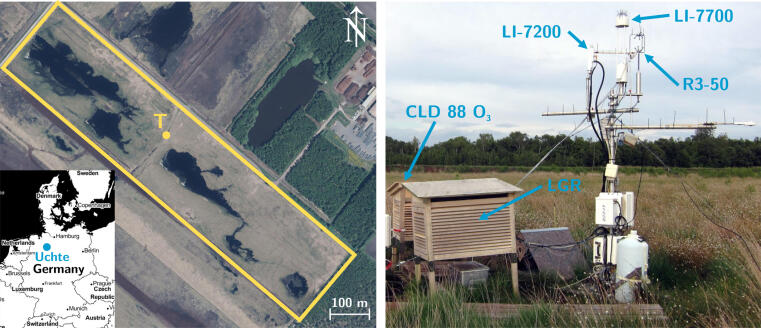
The restoration of drained peatland ecosystems is of particular importance as a long-term climate mitigation measure also in Germany. Our new paper recently published in the Journal of Geophysical Research: Biogeosciences shows promising results, 18 years after rewetting an area in the Großes Uchter Moor (Lower Saxony, NW Germany). Although the rewetted area is still a source of greenhouse gases, the resulting warming effect on climate is likely already lower than it was before rewetting started in 1999.
Entitled Being Cool is a Slow Ride When You're a Restored Wetland, our results have now been featured in the journal Eos as an Editors' Highlight!
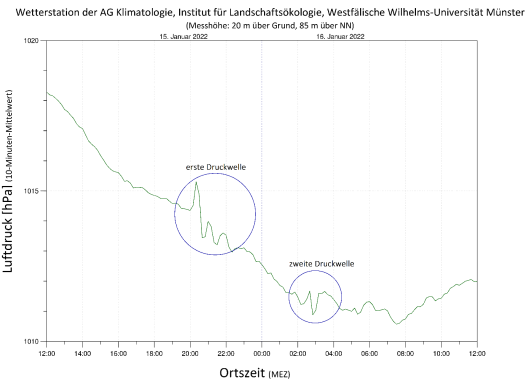
The eruption of the Hunga Tonga-Hunga Ha’apai volcano in the Pacific ocean in the early morning (5:00 am CET) of the 15th of January led to pressure waves that travelled around the globe. According to the German Weather Service, two pressure waves could be observed at numerous measuring stations with an interval of about six hours. Due to the geographical distribution of these, it was also possible to determine the time course of the pressure waves: At 20:15 (21:02) local time, a significant deflection of the barometers was observed on Helgoland (in Hohenpeißenberg). With the data of further measuring stations, a course of the first pressure wave from north to south could be confirmed. In the opposite direction (south to north), the second wave was detected six hours later in Hohenpeißenberg (on Helogland) at 02:12 (02:52) local time, respectively.
The aforementioned pressure waves were also detected on the roof of the Institute. The figure shows the 10-minute mean values of air pressure from noon on 15th of January to noon of the following day. The fluctuations of atmospheric pressure during the first pressure wave from around 20:30 to 22:00 are clearly visible. Apparently, the changes in air pressure due to the second pressure wave around six hours later are less striking, but still visible.
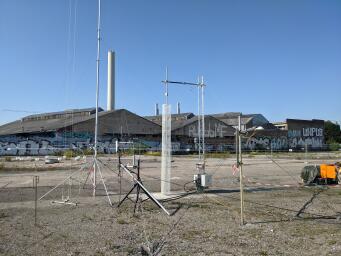
In July and August 2021, the Climatology Research conducted an intensive measurement campaign on urban climatology in cooperation with the Micrometeorology Group from the University of Bayreuth. One focus was on the analysis of weak wind situations and their relevance on exchance processes near the ground. Another focus was on the analysis of the urban heat island effect and in conjunction with the particulate matter pollution of the air. See also WWU => Communication.
.
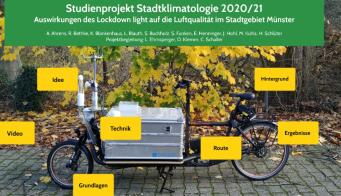
The study project of the bachelor students about urban climate was successfully completed. With the help of our cargo bike, which is equipped with several measuring instruments, the students investigated whether the "lockdown light" in November 2020 had an influence on the air quality in Münster. The results and general information on the project can be found here: final presentation Prezi
.
From the 19th to the 30th April the yearly conference of the European Geosciences Union (EGU) will take place online.
Two members of the working group will give a vPICO presentation:
Laura Ehrnsperger will present in session CL2.2 - 'Urban climate, urban biometeorology, and science tools for cities':
EGU21-15830: Air pollution in an urban street canyon: Novel insights from highly resolved traffic information and meteorology by Laura Ehrnsperger and Otto Klemm
The 2-minute presentation will take place on Tuesday, 27 April 2021, 13:34 CEST. The breakout text chat will run from Tuesday, 27 April 2021, 14:08-15:00 CEST.
Jennifer Sobiech-Wolf will present in session GI6.4 - 'Airborne observations in multidisciplinary environmental research using European Research Infrastructures; observations, campaigns and future plans':
EGU21-14864 SMART - Space monitoring of Arctic Tundra landscapes by Jennifer Sobiech-Wolf et al.
The 2-minute presentation will take place on Friday, 30 April 2021, 15:54 CEST. The breakout text chat will run from Friday, 30 April 2021, 16:00-16:15 CEST.
From the 19th to the 30th April the yearly conference of the European Geosciences Union (EGU) will take place online.
Participation is free of charge for students.
Registration is possible on the website of the EGU at https://www.egu21.eu/
There will be sessions on all abiotic topics ranging from „Climate: Past, Present & Future“ to „Geomorphology“ and „Planetary & Solar System Sciences“.
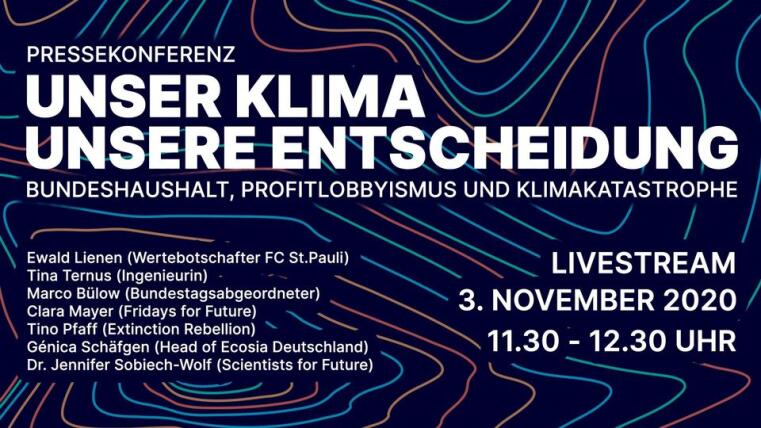
Our colleague Dr. Jennifer Sobiech-Wolf will represent the interests of the Scientists for Future on the press conference "Unser Klima. Unsere Entscheidung." on November 3rd, 2020.
Follow this link to the Livestream of the press conference.
The only presence event during the European Aerosol Conference 2020 was a public panel discussion on "Aerosols and COVID-19" in Aachen on September 3, 2020. The possible transmission of the virus via aerosol particles, effectiveness of oronasal masks and consequences for the management of indoor air quality were explained and discussed. A recording is now available online, the video can be downloaded here. Prof. Klemm took part in the panel discussion.
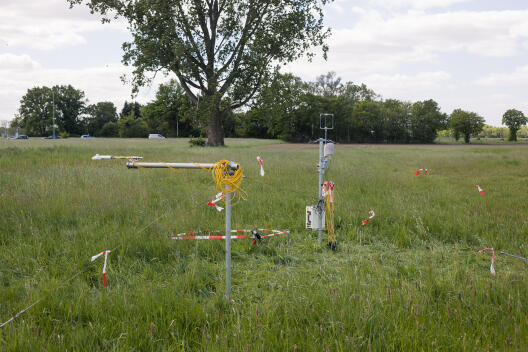
The master course for learning the eddy-covariance method was successfully completed in the summer semester despite restrictions due to the current pandemic. At our station "Steinfurter Straße" exchange of CO2 and H2O was measured. Special attention was paid to the quantification of the Leaf Area Index (LAI). Here you can find the final report of the students.
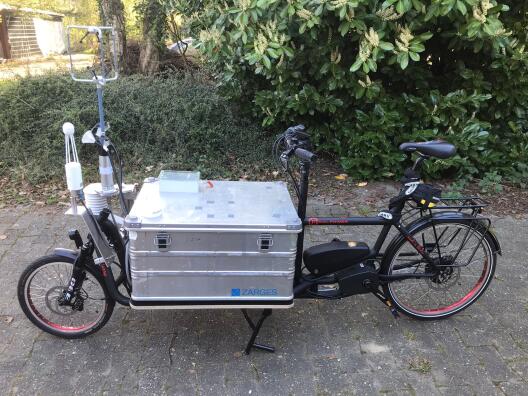
Due to the contact restrictions currently ordered by the state government, a reduction of emissions of all kinds has been observed in many places, which we also expect for Münster. For this reason, the Climatology Research Group has decided to measure aerosol particles with a high temporal frequency in Münster at times of the COVID19 crisis using a cargo bicycle. The cargo bicycle is equipped with several measuring instruments. Thereby, we ride 2 routes directly after each other. The first one on busy roads with typically high traffic volume near the promenade, the second one on the promenade itself.
In October and November 2019 a study project rode the same routes with the same cargo bicycle.
We are very excited about the results!
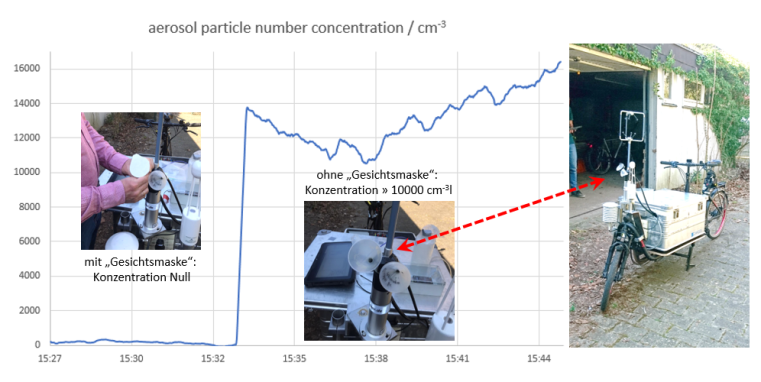
Today, we tested the filter efficiency of the fabric of a very simple face mask by using our cargo bicycle platform. As expected, the fabric filtered out over 99 % of the aerosol particles of diameters > 3 nm. Therefore, the cloth is an efficient protector of the person wearing the mask, as long as the breathing air passes through the mask material. Problems do arise when air sneaks around the mask.
We are happy to welcome Dr. Jennifer Sobiech-Wolf to our Team.
On 16 December, 2020, Falk Maneke-Fiegenbaum defended his thesis and finished his PhD. Congratulations from all of us!
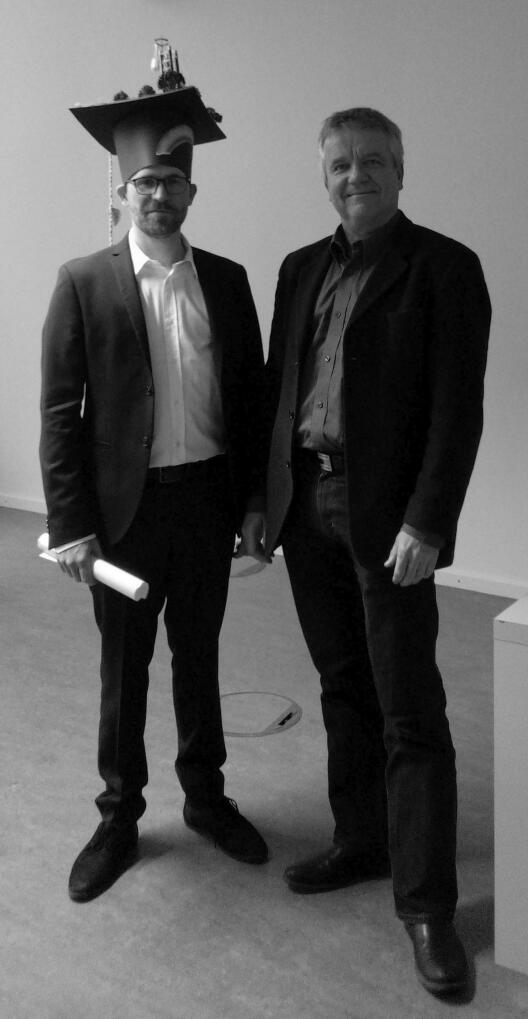
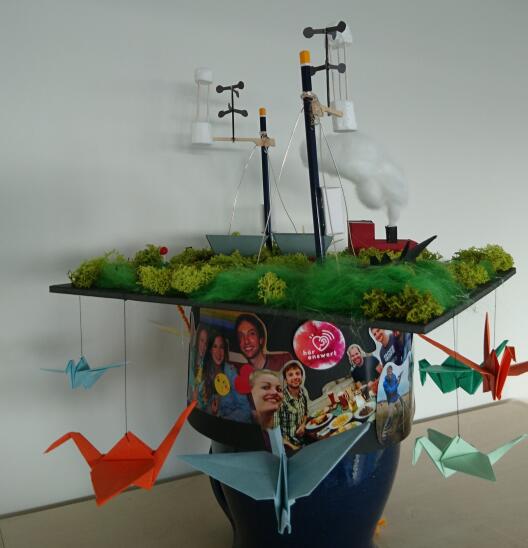
On 21 October, Carsten Schaller defended his thesis and finished his PhD. Congratulations from all of us!
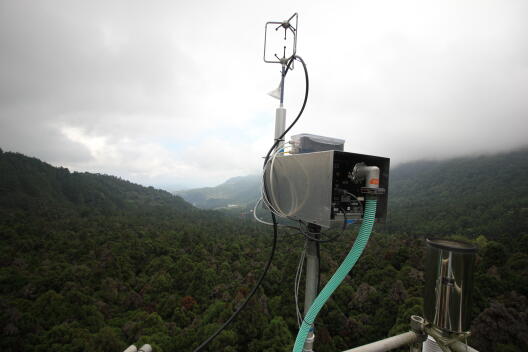
Bettina Breuer, Maiken Baumberger and Leonie Bronkalla measure fog in July and August 2019 in Taiwan. The measurements take place above the coniferous forest in Xitou (Experimental Forest, National Taiwan University).
The setup includes a caltech active fog collector which takes fog water samples with a temporary high frequency. After fieldwork the samples will be analyzed in a laboratory on ion composition.
Moreover, the fog droplet size distribution is measured by spectrometers for drops and diffuse light aerosol. Through a combination of both devices a further size spectrum of fog droplets can now be recorded for the first time. Evaluating all the data the researchers are supposed to establish the flux of fog drops sorted by their size.
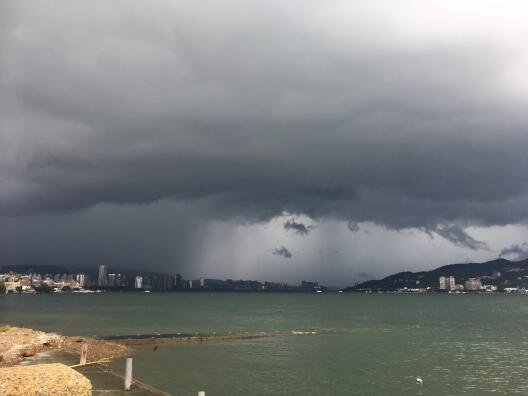
For the third time students of the courses geography and landscape ecology make an excursion to the island of Taiwan. It is organized by Prof. Dr. Otto Klemm, who has travelled Taiwan several times for research purposes. The 16 students get in touch with the flood management of Taipeh and visit the measuring site for fog in the forest of Xitou, which is currently run by students of the University of Münster. In the astronomic observatory on top of Mount Lulin, they watch the change of the atmospheric boundary layer with increasing solar radiation.
Besides meteorological aspects, the students gain an insight in Taiwanese culture. They visit a teahouse, try local fruit and enjoy the Asian cuisine.
The students are documenting their trip in a Blog. Every day they publish new stories and pictures.
Interested? Follow this link to the Blog.
Azubi@WWU: Tischler*in
A videoproduction describes the apprenticeship of a carpenter at the University of Münster. The video also shows the instrument shelters, built for the Climatology Working Group. Have a look!
https://www.youtube.com/watch?v=92F3wMsGhVE (Sorry, unfortunately it's in German)
From September 9th to 13th, 2019, the Ecological Society (Gesellschaft für Ökologie) will organize its 49th Annual Meeting in Münster.
The Climatology working group will organize two meetings concerning “Urban Air Pollution”, hosted by Prof. Dr. Andreas Held, Prof. Dr. Otto Klemm and Dr. Bastian Paas.
We invite scientists experienced in environmental meteorology and air pollution control that focus on topics like atmospheric chemistry, biometeorology, pollutant dispersion, and health effects within urban landscapes.
Topics will be different approaches to assess urban air pollution.
We would appreciate, if you handed in a paper or poster of your own research project until June 21st, 2019.
For further details, please visit the official GfÖ-Meeting website.
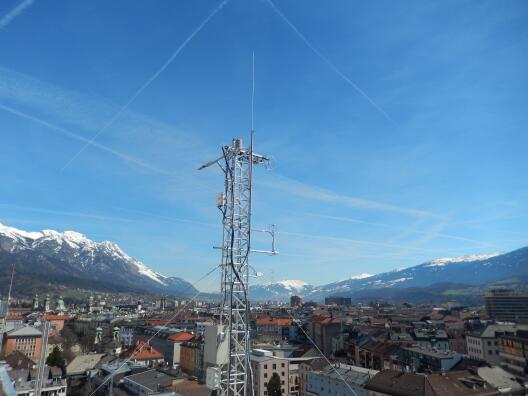
We are currently conducting an intensive measurement campaign from March 2019 to April 2019 at the IAO to characterize the turbulent exchange of particulate matter (PM) between the city and the atmosphere in cooperation with the Institute of Atmospheric and Cryospheric Sciences (University of Innsbruck, Atmospheric Chemistry and Physics research group, Prof. Thomas Karl, https://www.atm-phys-chem.at/). The combined measurements of size-resolved PM fluxes and chemical signatures of organic aerosols and trace gases will improve our understanding of emission patterns of fine and ultra-fine particles in urban environments. Additional stable isotope analysis of 15N and 13C are undertaken to identify the sources of particulate matter in Innsbruck.
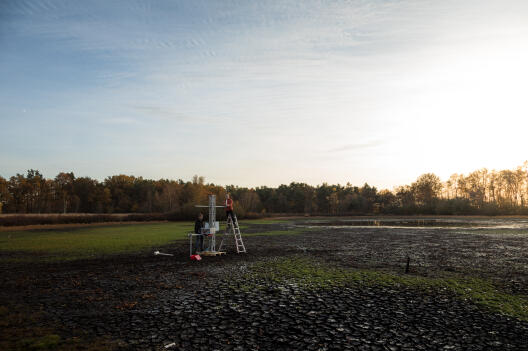
Since recently, atmospheric research is taking place at the lake Heideweiher near the village Hopsten in the very North of Northrine-Westphalia, Germany. Or should we say within the lake Heideweiher? In the surrounding natural reserve area numerous environmental research projects are carried out for many years. Also, one of our research groups at the Institute of Landscape Ecology, namely the Ecohydrology and Biogeochemistry Group, is involved. In cooperation with them and complementary to their methane flux measurements with chambers, we are interested in quantifications concerning the turbulent atmospheric fluxes of methane, one of the most important greenhouse gases besides CO2, using the eddy-covariance technique at the site. Therefore, an eddy-covariance tower has been installed at the bottom of the lake equipped with an ultrasonic anemometer. The installation process was plain and simple at the time since the lake was dried-out almost completely due to the drought in Germany this summer. With a preliminary study running, the expected to be complex wind field will be investigated during the next weeks.
At the beginning of November 2018, Prof. Klemm told the Mayor of the city, Markus Lewe, that he had left the Climate Council. "In the seven years since the reorganization of the Climate Council, in which I chaired, I have not been able to develop the Climate Council into a body of importance in the city of Münster." Repeated suggestions from the Climate Council, for example, to the sustainable redesign of the Former barracks area "York" (Gremmendorf) and "Oxford" (Gievenbeck), where many hundreds of new apartments will emerge, found little echo. "After weighing public and private concerns against each other and with each other, the ... statements were not followed," was one example vile, written answer to detailed proposals of the Climate Council. Debate with the climate council on contents hardly took place.
As early as the summer of 2018, Prof. Klemm announced internally that he would not continue to chair the Climate Council. However, the regular election in November 2018 went awry, as no candidate and no candidate for succession could be found. The vice-chairmanship also remained vacant. The Climate Council seemed paralyzed at this time. As a consequence, Prof. Klemm declared that he would leave the Climate Council. "I do not like doing that, but I have no choice. Maybe under other circumstances a successful reboot succeeds. "It requires a rethinking of some political representatives of the city and parts of the administration to help climate protection in Muenster to the importance that it needs.
Münster wants to reduce its CO2 emissions by 95% by 2050. The EU has committed to reduce it by 80% to 95%. The latest report of the IPCC (IPCC) to comply with the 1.5-degree target (Oct 2018) calls for a reduction in emissions to virtually 100% by 2050. Otherwise, dramatic further consequences for the world's population are expected. "Germany as an industrialized nation and especially those municipalities that have committed themselves to climate protection must make headway here," says Prof. Klemm. Against this background, there can be no other consideration than planning todays new buildings (keywords: York, Oxford) to emit no greenhouse gases in 2050! However, this does not seem to be considered. Prof. Klemm emphasizes that there is sufficient expertise in the politics and administration of Münster, and for many the willingness to consistently implement climate protection. Alone lack of consensus, the climate among other important aspects (social, financial, ...) grant the status of a guardrail of urban development. The role of the climate council has been marginal so far. Maybe a successful restart succeeds. Good luck!
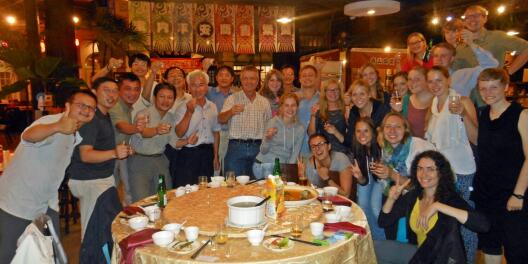
In the summer of 2019 an excursion to Taiwan will be offered. The excursion will take place from 20.07.2019 until 02.08.2019 and will focus on climatological aspects. Also the landscape, geology and culture are considered to get an unrestricted view of the country.
This semester a one-day excursion to Essen takes place. We will visit the German Weather Service (DWD) with the associated measuring field and the State Office for Nature, Environment and Consumer Protection NRW (LANUV). The excursion takes place on 07.02.2019 and there are no costs if a semester ticket is available. On 12.03.2019 there will be a one-day excursion to the German Weather Service in Offenbach and the EUMETSAT in Darmstadt. 20 Euro will be charged for the trip. For more information in english, please contact Prof. Klemm.
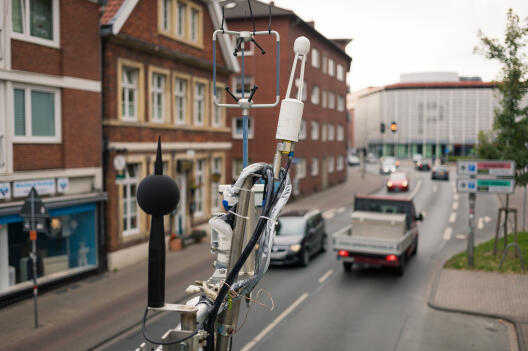
A new measurement campaign to determine urban air quality started at the end of August at the Bült, a busy street in the city center of Münster. The project „LUFTHY“ founded by the DFG includes continuous measurements of carbon dioxide, ammonia, nitrogen oxides and tropospheric ozone as well as ultrafine particles in the range between 6 nm and 10 µm at a high temporal resolution. We also collect additional information about the passing vehicles using a microphone and special cameras.
The results will help to determine the relationship between traffic-related emissions of gaseous air pollutants and ultrafine particles and the characteristics of the vehicle fleet (e.g. emission classes). On the long run, this project should contribute to the enhancement of atmospheric model predictions and help to mitigate urban air pollution.
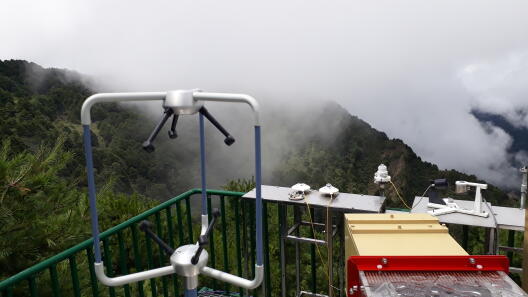
Bettina Breuer has been conducting fog measurements at the Lulin Atmospheric Background Station in Taiwan since mid-August. With the help of an active fog collector, fog water samples are taken automatically and with high temporal resolution, which are then analyzed for their ion composition. In addition, a new aerosol spectrometer is being used for the first time to measure the size distribution of mist droplets. Some exciting fog events have already been recorded.
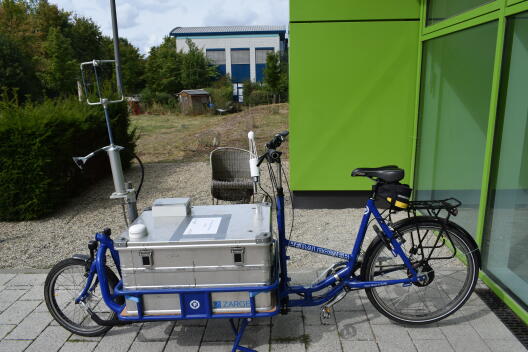
As part of a master's thesis, mobile measurements were carried out in the urban area with a cargo bike. These serve to investigate particle and CO2 concentration as well as their spatial distribution.
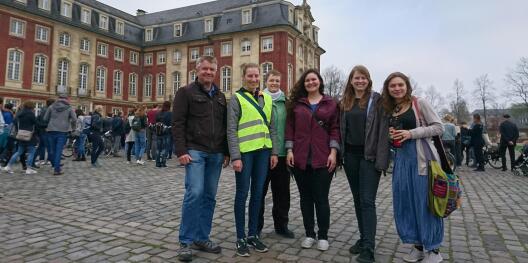
On April 14th, the March for Science took place in several cities. It is an international movement that demonstrates the value of science. Also in Münster people have come together with the motto "Science moves". After a walk through the city, the event would end with a panel discussion. Our AG took also part to stand for the freedom of science.
The "MünsterWetter" App provides the data of the weather station on the roof of the institute building. Unfortunately, the app had some dropouts that have been fixed by an update. The update is available in the Google Play Store for Android operating systems.
Since April 01, 2018, Bastian Paas joins the team of the research goup climatology. We welcome him and wish him a good start in his new job.
Since this semester Bettina Breuer supports the AG Climatology. We're happy to have her here.
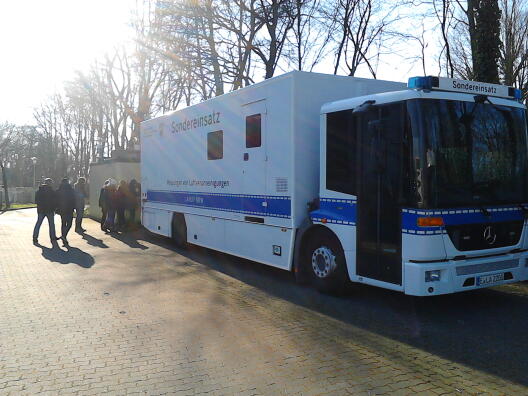
On 22th of february a field trip to the German Weather Service (DWD) and the State Office for Nature, Environment and Consumer Protection (LANUV) in Essen took place. At the DWD, the students had the opportunity to get to know the regional weather consultants and to experience the launch of a radiosonde at the measuring field. The LANUV provided insights into its wide range of tasks and in particular explained the monitoring of air quality in NRW. In addition, insight into the vehicle of the "Sondereinsatz" was granted. The on-call service maintained by the LANUV examines hazardous emissions in the event of damage on site.